Text
Yeah, these things I feel I understand and I feel like I understand the expectations of someone that would go through formal conversion. It's tricky in the way in person, at a synogogue would be more ideal and the online resources are just...supplementary but likely not satisfying for either the person converting or the rabbis standards, but at least there would be some sort of introduction that may kind of be alright in a class labeled Judaism 101: The Most Basic Online Course You Can Find.
I've been working in my mind a pros and constantly list and trying to take the idea of conversion very, very slowly since I understand that the process may take even more than a year despite this being something that's been floating in the back of my mind off and on for years.
It's all a process that I understand is made diffucult since, which like any transitional period, has it's highs and lows. It's joy and woes, and the moment I'd be able to ask my rabbi questions, I feel as though the confusions or misconceptions that I may have may clear up with those interactions,
Also thank you again for taking the time to really talk to me, I do understand that in this moment, now without a rabbi, it is an understatement of what the faith and the people are like, currently with my resources it's not available to me and even if that's a common issiue. that will change with time will show me more understanding as time goes on
Was trying to ask a question about sabbath and yom tov observations on reddit and got hit with "you're not jewish so you can do whatever you want on your day off"
I...was uh asking a question about giyur scenarios whether or not its was still considered working on the sabbath if i was still writing since I'm a writer and I'm very passionate about it and how I could look at either "doing it anyway" because its a special process for me, its a weird gray area in conversion because yeah, you're not really jewish "yet until bet dein happens" so that raises the question, do i still observe these mitzvahs or loosen up on my inept observation since i haven't really had connection with the community and faith and not being a certified jewish person with a given set of instructions by a rabbi yet?
or, going back into circoed with myself, do I still rest on the sabbath since im trying to gain a deeper understanding for what the nitty gritty of resting on the sabbath is like and the relationship with that from someone born jewish? I can't exactly know what its like to be born jewish but that's partly what i was asking for, and also specified if that was too much/saying/asking for too much when im not
I wanted to understand the basic priciple, perspective, and expectations of someone in the position and *more importantly* what someone does with the feeling of wanting to do these things "on their day off" when they are told to rest, do these things still qualify as rest/work if they connect you to your passions/find it a divine act?
Hopefully this clarifies my question even though its kinda tough, sounds wishy washy or comes off as middle row but I'm curious since there's a million ways to be Jewish, where can i fit myself if i choose to convert, some jews observe differently and as someone converting, the expectations of carrying out mitzvots are gonna be higher if you want to merge with something you werent born into
7 Sivan, 5783
17 notes
·
View notes
Text
Thanks for addressing my question and entertaining the questions presented in the post, I figured that all in all it was forbidden on the Sabbath but I figured that even if they were kind obvious or basic questions, they're still questions that I have considering conversion and maybe other people that want to convert as well. A dumb down disection, I guess. And personally, an attempting to take it as a "practice at conversion" as opposed to explicitly stating (in irl circles) that I want to convert to see if it's right for me to assimilate into a faith/culture that's always drawn me to it but also wondering what aspects and how far I can personally, respectfully take it and represent whilst observing.
I also want to state that I hold these laws in high regard and a lot of intrigue, part of me wants to commit myself to them, but I also feel the need that i need to understand the workings of them better if I want to be "as a jew" and understanding how these concepts vary between jews in different sects and observations.
Long drawn out explanation of where I'm at internalizing these things, they're typically very point blank, straight forward, but I still very much appreciate the breakdown
Was trying to ask a question about sabbath and yom tov observations on reddit and got hit with "you're not jewish so you can do whatever you want on your day off"
I...was uh asking a question about giyur scenarios whether or not its was still considered working on the sabbath if i was still writing since I'm a writer and I'm very passionate about it and how I could look at either "doing it anyway" because its a special process for me, its a weird gray area in conversion because yeah, you're not really jewish "yet until bet dein happens" so that raises the question, do i still observe these mitzvahs or loosen up on my inept observation since i haven't really had connection with the community and faith and not being a certified jewish person with a given set of instructions by a rabbi yet?
or, going back into circoed with myself, do I still rest on the sabbath since im trying to gain a deeper understanding for what the nitty gritty of resting on the sabbath is like and the relationship with that from someone born jewish? I can't exactly know what its like to be born jewish but that's partly what i was asking for, and also specified if that was too much/saying/asking for too much when im not
I wanted to understand the basic priciple, perspective, and expectations of someone in the position and *more importantly* what someone does with the feeling of wanting to do these things "on their day off" when they are told to rest, do these things still qualify as rest/work if they connect you to your passions/find it a divine act?
Hopefully this clarifies my question even though its kinda tough, sounds wishy washy or comes off as middle row but I'm curious since there's a million ways to be Jewish, where can i fit myself if i choose to convert, some jews observe differently and as someone converting, the expectations of carrying out mitzvots are gonna be higher if you want to merge with something you werent born into
7 Sivan, 5783
17 notes
·
View notes
Text
However, I think that maybe at first I took it personally, when in fact, whether or not I'm Jewish in any capacity. That fact remains that if it's "my day off and I can do what I want" and rationalize it how I please. Might also be another way to interpret it before jumping to. "Got my first, 'youre not a real jew (yet) so don't worry about it' im gonna be sad about it" maybe its just a thing i have to rationalize with myself instead of putting forth my gray area/running in circles on people that
Maybe only hypotheticals?
Was trying to ask a question about sabbath and yom tov observations on reddit and got hit with "you're not jewish so you can do whatever you want on your day off"
I...was uh asking a question about giyur scenarios whether or not its was still considered working on the sabbath if i was still writing since I'm a writer and I'm very passionate about it and how I could look at either "doing it anyway" because its a special process for me, its a weird gray area in conversion because yeah, you're not really jewish "yet until bet dein happens" so that raises the question, do i still observe these mitzvahs or loosen up on my inept observation since i haven't really had connection with the community and faith and not being a certified jewish person with a given set of instructions by a rabbi yet?
or, going back into circoed with myself, do I still rest on the sabbath since im trying to gain a deeper understanding for what the nitty gritty of resting on the sabbath is like and the relationship with that from someone born jewish? I can't exactly know what its like to be born jewish but that's partly what i was asking for, and also specified if that was too much/saying/asking for too much when im not
I wanted to understand the basic priciple, perspective, and expectations of someone in the position and *more importantly* what someone does with the feeling of wanting to do these things "on their day off" when they are told to rest, do these things still qualify as rest/work if they connect you to your passions/find it a divine act?
Hopefully this clarifies my question even though its kinda tough, sounds wishy washy or comes off as middle row but I'm curious since there's a million ways to be Jewish, where can i fit myself if i choose to convert, some jews observe differently and as someone converting, the expectations of carrying out mitzvots are gonna be higher if you want to merge with something you werent born into
7 Sivan, 5783
17 notes
·
View notes
Text
Was trying to ask a question about sabbath and yom tov observations on reddit and got hit with "you're not jewish so you can do whatever you want on your day off"
I...was uh asking a question about giyur scenarios whether or not its was still considered working on the sabbath if i was still writing since I'm a writer and I'm very passionate about it and how I could look at either "doing it anyway" because its a special process for me, its a weird gray area in conversion because yeah, you're not really jewish "yet until bet dein happens" so that raises the question, do i still observe these mitzvahs or loosen up on my inept observation since i haven't really had connection with the community and faith and not being a certified jewish person with a given set of instructions by a rabbi yet?
or, going back into circoed with myself, do I still rest on the sabbath since im trying to gain a deeper understanding for what the nitty gritty of resting on the sabbath is like and the relationship with that from someone born jewish? I can't exactly know what its like to be born jewish but that's partly what i was asking for, and also specified if that was too much/saying/asking for too much when im not
I wanted to understand the basic priciple, perspective, and expectations of someone in the position and *more importantly* what someone does with the feeling of wanting to do these things "on their day off" when they are told to rest, do these things still qualify as rest/work if they connect you to your passions/find it a divine act?
Hopefully this clarifies my question even though its kinda tough, sounds wishy washy or comes off as middle row but I'm curious since there's a million ways to be Jewish, where can i fit myself if i choose to convert, some jews observe differently and as someone converting, the expectations of carrying out mitzvots are gonna be higher if you want to merge with something you werent born into
7 Sivan, 5783
#goy boy rambles#giyur#i really hope this doesnt come off as insensitive and overstepping bounds#its out of a place of curiosity since i know that some jewish people observe differently#like not eating kosher#etc#jewblr#jew by choice
17 notes
·
View notes
Text
It's funny to me to me that the best thing I think of growing up protestant was the fact that i resonated better with the teachings of jesus over the Christian god
Whereas with Judaism, I have a more direct link to the compassion I'd been longing for my whole life for with the existence of The Name
I dont know theres something about who we are told who g-d is and His Son is supposed to justify that but with Judaism, its so chill the way a creator goes to moses like I'm who I am bih, ut is what it is
0 notes
Text
converting to judaism is so lonely :( how do i stay off my phone and revel in the company of humanity when nobody around me is in the same state of mind at the same time :(
4 notes
·
View notes
Text
Thinking about how linked transition and becoming jewish is for me. Just like... I think that transition has really taught me how to value myself, and therefore, it has taught me patience and wonder with one day becoming jewish. It's the learning, unlearning, affirmation, patience, and pain in both that really make me confident in myself and my choices, and I'm grateful for that, always.
99 notes
·
View notes
Text
Listen, I know it's very much a thing that utopian leftists think that religions will simply stop existing once all of our material needs are met, but that is just not the case.
Human beings need ritual. If we are deprived of ritual, we make new ritual. It does not matter if you call it religion or state or whatever it is you call it, human beings will keep making up new rituals.
You cannot stop us, and saying 'this ritual which I like and doesn't hurt anyone else is fine, but that ritual which you like and doesn't hurt anyone else is bad' is just bigotry.
When I say 'you cannot stop us,' I literally mean you cannot stop human beings from making up rituals and religions. Leave a group of six year old girls alone near a mud pit for an hour and you will come back to a newly-minted faith. We make ritual. We make culture. That is what we do.
No, Judaism will not 'naturally cease to exist' when all of our material needs are met. What will happen then is that the Jews will get Jewier, because we will have all the time in the world to study Torah and write stories and make Jewish art. If you met all of my material needs tomorrow, two days from now there would be six more hamsas, a complete bound copy of all the volumes of the Talmud, and a shit-ton of giant Jewish art prints in my house.
You cannot stop people from making up culture and religion. It is, arguably, the thing which makes us human, one of the defining features of our collective humanity. We will always make up silly songs and new religions, and the idea that we'll just give all of that up for some vanilla yogurt and taupe jumpsuits utopian existence is absurd and beyond belief.
#theres this book series that i reaply love that does this!#arc of a scythe#religion as a whole is seen as kind of primative in a way? theres a group called tonists (theres a whole theme subplot & its done great)#however! i want to still write a character witihin that storyline that still holds onto jewish thought and values#ive been thinking about it for a whipe and this post explains exactly why in my mind why judaism wouldnt (and really shouldnt) go anywhere#or meld into a new tone cult/religion thats looks like mortal age religion because some of humanity still need that#idk i feel like tone cult still may not#but maybe theres a sect? that could resemble it#still trying to think of how judaism would fit in the narrative
12K notes
·
View notes
Photo
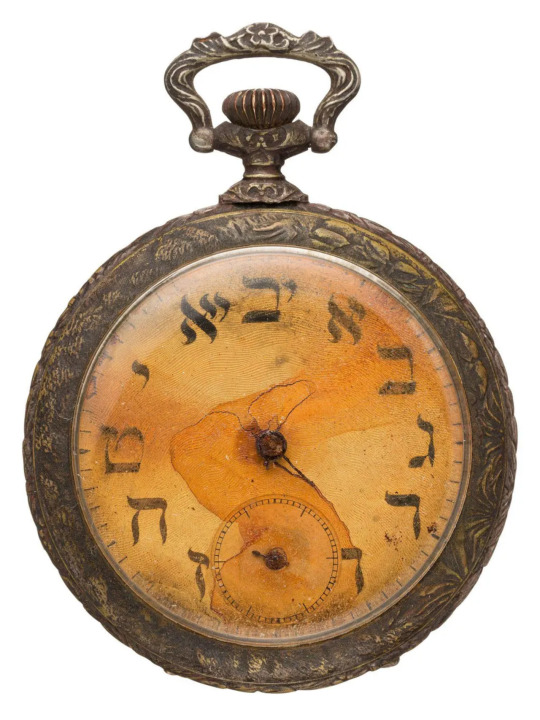
Pocket watch with Hebrew numerals. More information and images at source.
103 notes
·
View notes
Text

Sadie Sadie The Rabbi Lady — Jewish drag queen, activist and founding member of the Sisters of Perpetual Indulgence
ph: Jean-Baptiste Carhaix | 1983
24K notes
·
View notes
Text
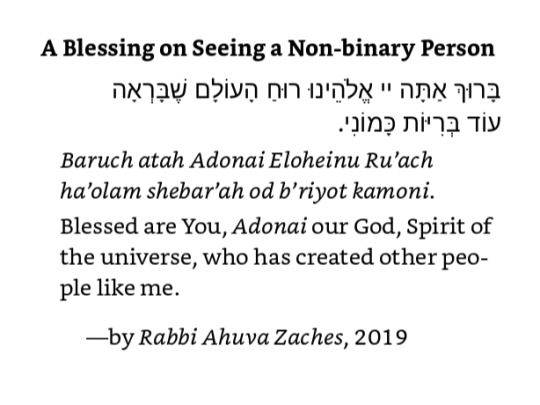
mishkan ga'avah: where pride dwells, edited by rabbi denise l. eger
17K notes
·
View notes
Text
My own reading list won't be as organized until maybe I build and collect titles I want to read and find, but
The Glass Man In the Cage
Film: The Eighty-First Blow.
Dvadtsat' dva (Twenty-Two, a Russian-Israeli literary journal)
The Shriek of Silence: A Phenomenalogy of The Holocaust Novel 1992 by David Patterson
Night by Elie Wiesel
Dawn by Elie Wiesel
The Accident by Elie Wiesel
The Town Beyond the Wall by Elie Wiesel (The author that introduced me to a lot really loves Elie Wiesel)
The Oath by Elie Wiesel
A Beggar In Jerusalem by Elie Wiesel
Kuzari by Judah Halevi
The Star of Redemption by Franz Rosenzweig
The Thirteen Petalled Rose by Rabbi Steinsaltz
The Brothers Karamazov by Dostoevsky.
Maimonides' Guide for the Perplexed (started reading)
Blood From the Sky by Piotr Rawicz
Jewish Reading List
Currently Reading
Living Judaism by Wayne D. Dosick
A History of Judaism by Martin Goodman
Essential Judaism by George Robinson
Want to Read
Intro to Judaism
Judaism's Ten Best Ideas by Arthur Green
Jewish Literacy by Rabbi Joseph Telushkin
Other Nonfiction
Jews, God, and History by Max I. Dimont
To Be A Jew by Rabbi Hayim Halevy Donin
To Pray As A Jew by Rabbi Hayim Halevy Donin
The Prophets by Abraham Joshua Heschel
People Love Dead Jews by Dara Horn
To Life! by Harold S. Kushner
Uncovered by Leah Lax
Lovesong: Becoming a Jew by Julius Lester
Why the Jews? by Dennis Prager & Rabbi Joseph Telushkin
Hear Our Voice: Women in the British Rabbinate by Rabbi Sybil Sheridan
The Bible Unearthed by Neil Asher Silberman & Israel Finkenstein
Israel: A Simple Guide to the Most Misunderstood Country on Earth by Noa Tishby
Cut Me Loose by Leah Vincent
Zakhor: Jewish History and Jewish Memory by Yosef Hayim Yerushalmi
Fiction
Color Me In by Natasha Díaz
From Dust, A Flame by Rebecca Podos
The Wise and the Wicked by Rebecca Podos
Lucy Clark Will Not Apologize by Margo Rabb
Yes No Maybe So by Aisha Saeed & Becky Albertalli
Recommended for You by Laura Silverman
The Trial of God by Elie Wiesel
Holocaust Memoirs & Related
The Nazi Officer's Wife by Edith Hahn Beer
The School That Escaped the Nazis by Deborah Cadbury
We Wept Without Tears by Gideon Greif
Ich war Hitlerjunge Salomon by Sally Perel
Survivor by Sam Pivnik
Alice's Book: How the Nazis Stole My Grandmother's Cookbook by Karina Urbach
Helga's Diary by Helga Weiss
Night by Elie Wiesel
Have Read
Intro to Judiasm & Other Nonfiction
Choosing a Jewish Life by Anita Diamant
Living a Jewish Life by Anita Diamant
Settings of Silver by Stephen M. Wyler
Jews Don't Count by David Baddiel
Confessions of a Rabbi by Rabbi Jonathan Romain
Becoming Eve by Abby Chava Stein
Fiction
What We're Scared Of by Karen David
It's a Whole Spiel by various Authors, ed. by Katherine Locke & Laura Silverman
My name is Asher Lev by Chaim Potok
Holocaust Memoirs
Lily's Promise by Lily Ebert
Return to Auschwitz by Kitty Hart-Moxon
The Twins of Auschwitz by Eva Mozes Kor
The Auschwitz Volunteer by Witold Pilecki
The Last Jew of Treblinka by Chil Rajchman
The Saboteur of Auschwitz by Colin Rushton
Eva's Story by Eva Schloss
Maus I & II by Art Spiegelman
98 notes
·
View notes
Text
The largest online encyclopedia of Jewish art launched!
It’s called The Bezalel Narkiss Index of Jewish Art and can be found here!
21K notes
·
View notes
Text
i hope everyone understand that there’s a connection between the rising antisemitism and rising anti-queer sentiment and all the other forms of bigotry that are bubbling up right now. it’s all about fear. fear of a world in which white cishet xtians do not control wealth, property, and people. the idea that laws will not cater to them, that they’ll receive no special treatment, that everyone will be entitled to the same respect, its terrifying to them. i guess i’d be scared too if i was a coward fighting selfishly for a cruel and foolish cause.
3K notes
·
View notes
Text
“When Moses, at the burning bush, says to God, “Who are you?” God says to him three words: “Hayah asher hayah.” And those words are mistranslated in English as “I am that which I am.” But in Hebrew, it means “I will be who or how or where I will be,” meaning, don’t think you can predict me. I am a God who is going to surprise you. And one of the ways God surprises us is by letting a Jew or a Christian discover the trace of God’s presence in a Buddhist monk or a Sikh tradition of hospitality or the graciousness of Hindu life. You know, don’t think we can confine God into our categories. God is bigger than religion.”
— Rabbi Jonathan Sacks in “The Dignity of Difference.”
(via beingblog)
5K notes
·
View notes
Text
The Kosher Meat Boycott of 1902
Everyone knows about the kosher meat boycott from the early 1900s right?
No?
Okay I can't possibly do the whole history justice because I'm still researching it, so I encourage you to go look for more info when you have a chance, but the gist of it is that a bunch of rich dudes who were literally a BEEF TRUST (BEEF TRUST can you IMAGINE your job title being BEEF TRUST) decided "hey we don't have enough money, somehow, so let's hike the price of kosher meat by an absolutely absurd amount"
The absurd amount was going from 12 cents a pound to 18 cents. Now, I'm gay, so I can't do math, but that's a pretty significant hike all at once.
This is a dick move for like eleventy million reasons. Obviously because oh my god no you do not need to be richer are you kidding me. Also because hey hiking the price of food when you don't have to absolutely sucks and you shouldn't do it. EXTRA also because observant Jews can't just be like "oh looks like kosher beef is out of our price range, let's just grab something else". Jews who keep kosher literally cannot knowingly eat something that is not kosher unless it is literal life or death. By pricing people out of meat entirely, it completely fucked up meals for so many families.
Remember, this was 1902. It's not like people could easily access, like, vegan alternatives for stuff. This isn't a "just use some tofu" situation. People who were priced out of kosher meat were being priced out of all the nutritional benefits that meat provides. These were families of hard workers, with elderly relatives, with little kids, suddenly unable to access a very important part of their diet. It was a big deal.
So what happened?
Well, have you ever pissed off a Jewish woman who needed to feed her family? Probably not, because you have lived to tell the tale.
Jewish mothers, Jewish housewives, Jewish women workers - they said "fuck this" and boycotted. Protested. They broke windows, they threw meat, they started fired, they made home visits to make sure no one was secretly buying kosher meat. These women absolutely did not fuck around. They DEMANDED a fair price for an essential part of their lives, and by golly, quite a bunch of them got arrested in the process of making that demand.
Three weeks after the protests began, the price was lowered by four cents a pound. Frustratingly, prices would later rise again, but still. There was success. So much so that this boycott was basically used as a blueprint for a lot of other protests in the future, including the 1909 shirtwaist strike. And it was a bunch of thirtysomething housewives doing this! That is so fucking cool!
Anyway I just feel like this is a neat little bit of history that more of us should know about!
20 notes
·
View notes
Text
Hedy Lamarr was one of the most glamorous woman in Hollywood. The reason why we have wifi is because of her and that needs to be said.
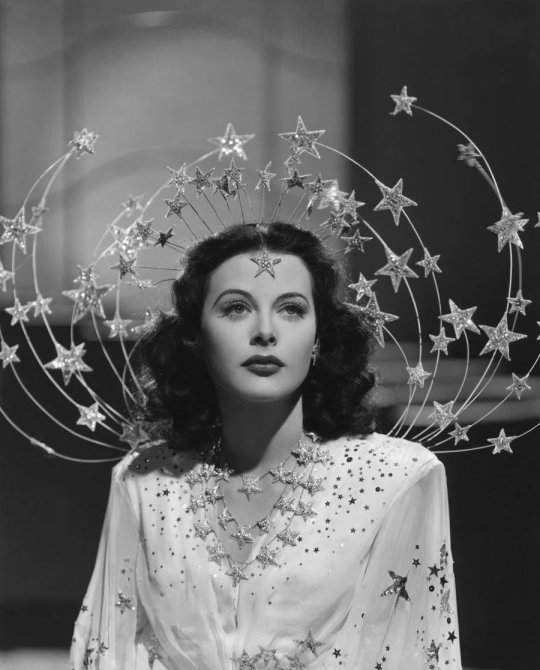
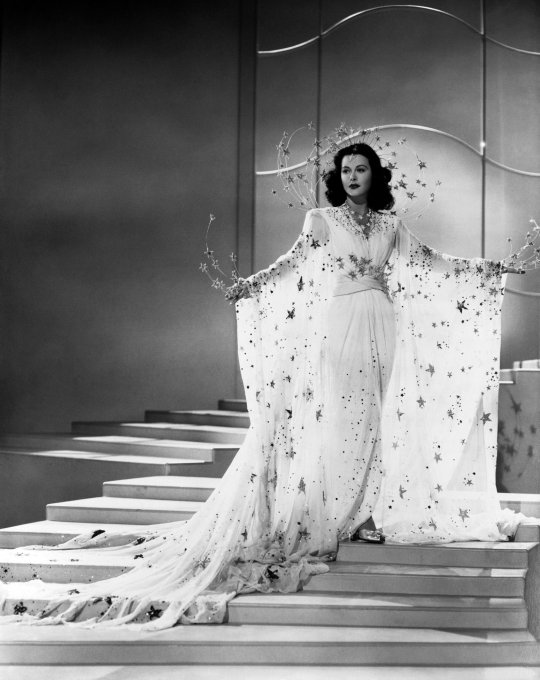
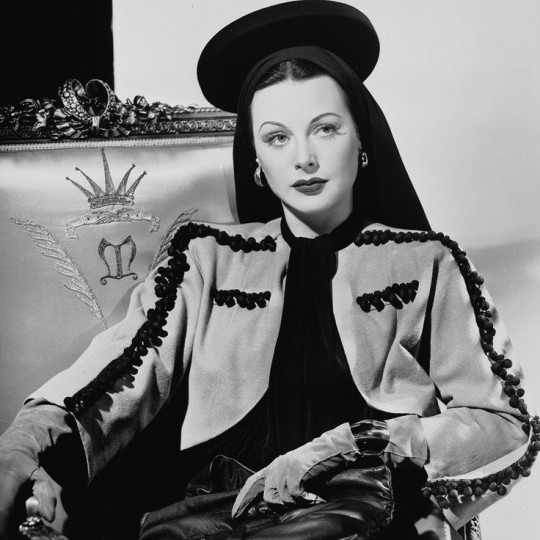
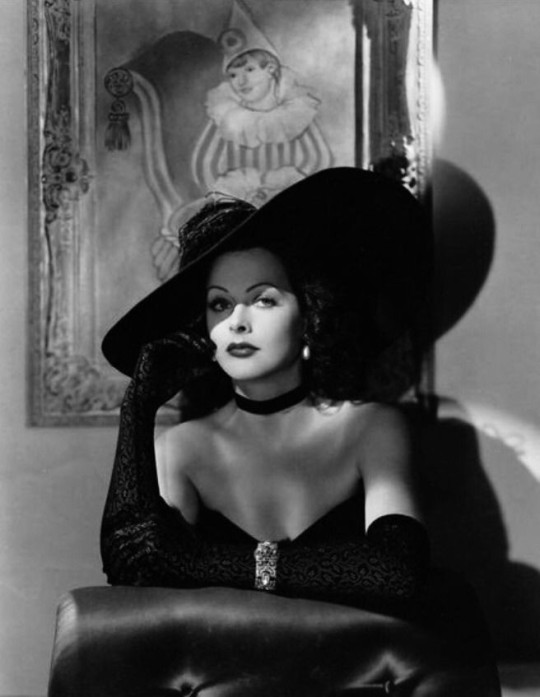
135 notes
·
View notes